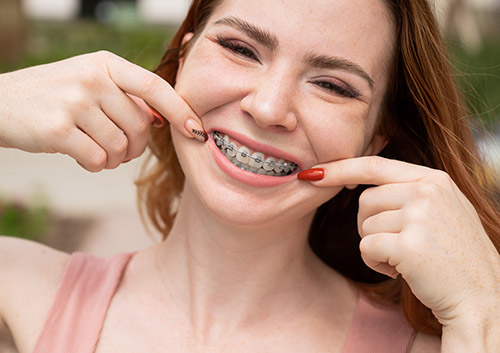Are you too sensitive?
October 19th, 2022

We’re not talking about tearing up at the end of a sad movie, or that uncomfortable scratchy feeling you get from a coarse wool sweater—no shame in that kind of sensitivity! But it is a shame if you’re feeling unpleasant tooth sensitivity, especially while you’re wearing braces. No fear—we have some helpful ideas to make you more comfortable as you create your healthy, confident smile.
What do we mean by tooth sensitivity? You know it if you’ve felt it. Pain when you have a cold drink. Or a hot one. Or a sweet treat. Wincing when a light breeze hits your smile. Discomfort after an adjustment.
Fortunately, these annoying twinges can be avoided or eased with some proactive practices.
Keep Up with Your Brushing and Flossing
The oral bacteria in plaque break down enamel when they’re left on the teeth for too long. The result is a cavity, which leaves your sensitive dentin, the layer of the tooth between the enamel and the inner pulp chamber, exposed to elements which can trigger pain. These all-too-common elements include heat, cold, air, or sweet foods. If you suspect you have a cavity, a visit to the dentist will make sure your tooth is cleaned and filled to prevent further damage.
Better yet, prevent cavities before they cause tooth sensitivity. It can be harder to keep your teeth their cleanest while you’re in braces, but it’s more important than ever. You don’t want to have brackets and wires removed, even temporarily, to treat a cavity! You can keep decay at bay by:
- Brushing after every meal and snack.
- Flossing whenever necessary, making sure to clean around your brackets and wires.
- Using cleaning tools made for braces for the easiest and most effective dental hygiene.
Avoid Aggressive Brushing
If you’re using anything other than a soft toothbrush, time for a shopping trip! Using a stiff bristled brush is almost always too abrasive for even the strongest enamel. And vigorous brushing is more harmful than helpful. Poor tools and poor technique can wear away enamel, and, when enamel is worn away, the more sensitive dentin is exposed. Your gums can also be injured, exposing the tops of your roots—which are more sensitive than the enameled crowns.
If your teeth are sensitive because of abrasive brushing, talk to Dr. Organ, Dr. Kirtane, and Dr. Hart about possible solutions for keeping your teeth both clean and strong.
- Use a softer-bristled brush.
- Try toothpaste designed for sensitive teeth.
- Practice proper brushing technique. Gently rub, don’t scrub!
Care for Yourself after Adjustments
Your teeth might be sensitive after an adjustment. This discomfort is normal, and should pass in a few days. In the meantime, treat yourself kindly.
- Brush as usual, taking special care to brush gently.
- Fill your menu with soft and soothing foods. Cool treats like classic ice cream and pudding, or healthier choices like frozen yogurt and fruit smoothies. Comfort foods like cream soups and mashed potatoes. Or all-day breakfasts of oatmeal, pillowy pancakes, or scrambled eggs.
- Take over the counter medication as recommended and as necessary.
Be sensitive to your needs while you’re in braces. If you’re feeling any kind of tooth sensitivity, talk to Dr. Organ, Dr. Kirtane, and Dr. Hart at our Hamilton, ON office. We have solutions which will make sure you’re both comfortable and twinge-free on your journey to a healthy, attractive smile!









